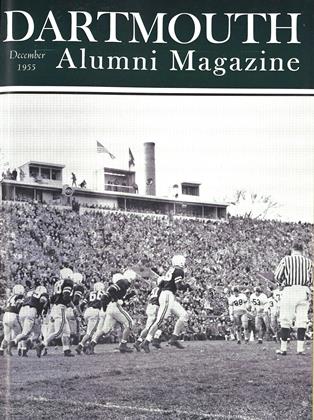ByRichard Chase '57. New York: WilliamSloane Associates, 195;. 191 pp. $3-75.
Dartmouth can be proud of the distinguished critical and interpretative work in the field of American literary studies beingdone by Mr. Richard Chase of the Columbia University faculty. His latest book, WaltWhitman Reconsidered, issued in Sloane's American Men of Letters series in this centenary year of Leaves of Grass, is an attempt to clarify and re-assess the basic and permanent values in Whitman, in the face of what Mr. Chase feels is "the unjustified devaluation Whitman has encountered at the hands of the highly skilled linguistic and symbolistic criticism which exerts so much influence at present," and in the face of "our rather vague notions about his work" which put us "in danger of entirely losing sight of what is vital and enduring."
The result is a book that is stimulating and provocative, highly readable, never dogmatic, and rarely professorial. Mr. Chase's "essay in 'appreciation,' of a cultural-historical sort," as he calls it, is an admirable example of packed conciseness. In approximately 170 pages the author manages not only to "reconsider" Whitman as poet, but also to give an adequate picture of the poet's life - (Mr. Chase in his biographical portions treats most fully the years before 1855 as being the important formative ones, and he does not let himself be carried away by the inevitable sexual problem.) - to convey a sense of Whitman's relationship in the realm of ideas and attitudes to the other leading American literary figures of the great American period, as well as to such later figures as Joyce, Eliot, Hemingway, and various others; to indicate the main cultural influences that undoubtedly worked on Whitman; and to discuss, most interestingly, Whitman's standing with critics and readers at the present time.
Of the three aspects of Whitman as poet that Mr. Chase concentrates on in his critical treatment - Whitman "the comic poet," Whitman "the radical realist," and Whitman "the profound elegist" - it is the first, Whitman "the comic poet," that is the most novel and probably the most controversial, although a little ground for such an approach was perhaps broken years ago by Miss Constance Rourke in her now classic study, AmericanHumor. Mr. Chase's contention that "Song of Myself," for instance, "combines Dionysian gaiety and an impulse toward verbal artificiality with the tone and cultural presuppositions of American humor" could stand a little fuller development, but, to this reader at least, the idea in its main implications is stimulating and convincing. Detailed elaboration is hardly possible in the space at Mr. Chase's disposal, and he has given us a richly packed volume as it is that says a great deal and suggests even more than it says. Certainly "comic poet" is a more refreshing term to apply to Whitman than the overworked term "cosmic poet," and one of the gratifying features of Mr. Chase's book is that it is not permeated by the familiar rhapsodic utterances about Whitman's cosmic affiliations.
In conclusion Mr. Chase feels that while Whitman is undoubtedly suffering a dimin- ished reputation at the present time, there are signs that "these attitudes are beginning to change - and new ways of understanding Whitman, or the rediscovery of old ways, are clearly beginning to reinstate him." Whitman's best writing, Mr. Chase maintains, is of the kind that "arises from the native energies and dilemmas of life and is committed to the radical literary and cultural values of its time." In the long run, Mr. Chase believes, "there can be no question that Whitman will live. But the question of how, or whether, he may be said to live for us, at a given moment of history, is always before us."
Mr. Chase's book throws much light on that question as it relates to this present given moment of history. From the book Whitman emerges as a more clearly -defined, human, and understandable figure. It is a fine book.
 View Full Issue
View Full Issue
More From This Issue
-
 Feature
FeatureThe Meaning of a Liberal Education
December 1955 By PROF. ARTHUR E. JENSEN -
 Feature
FeatureA Course of Reading for Dartmouth Men
December 1955 By CHARLES C. MERRILL '94 -
 Feature
FeatureChairman's Report THE 1955 ALUMNI FUND
December 1955 By Roger C. Wilde '21 -
 Feature
FeatureALUMNI FUND ENDOWMENT FUNDS
December 1955 -
 Feature
FeatureChass Achierement 1955 Fund
December 1955 -
 Feature
FeatureStudent Government at Dartmouth
December 1955 By RUSSELL W. BRACE '56
KENNETH A. ROBINSON
-
 Books
BooksTHE PEARL OF HER SEX,
November 1947 By Bill Cunning, KENNETH A. ROBINSON -
 Books
BooksWALT WHITMAN IN ENGLAND
October 1934 By Kenneth A. Robinson -
 Books
BooksTHE TELEPHONE BOOTH INDIAN
May 1942 By Kenneth A. Robinson -
 Books
BooksFINGERBOARD
April 1950 By KENNETH A. ROBINSON -
 Books
BooksTHE LONELY CRO WD: A STUDY OF THE CHANGING AMERICAN CHARACTER
April 1951 By KENNETH A. ROBINSON -
 Books
BooksCONTEMPORARY DRAMA, ELEVEN PLAYS, AMERICAN, ENGLISH, EUROPEAN.
June 1957 By KENNETH A. ROBINSON
Books
-
 Books
BooksBriefly Noted
JANUARY 1971 -
 Books
BooksTHE SEA WITCH
March 1933 By A. H. M -
 Books
BooksPROPAGANDA COMES OF AGE.
NOVEMBER 1965 By CHAUNCEY N. ALLEN '24 -
 Books
BooksREBELS AND GENTLEMEN
December 1942 By Herbert Wells Hill -
 Books
BooksSTRUCTURAL PRINCIPLES IN OLD ENGLISH POETRY.
JANUARY 1969 By L. DEAN PEARSON -
 Books
BooksA Tortured Process
MAY 1983 By William N. Fenton '30


